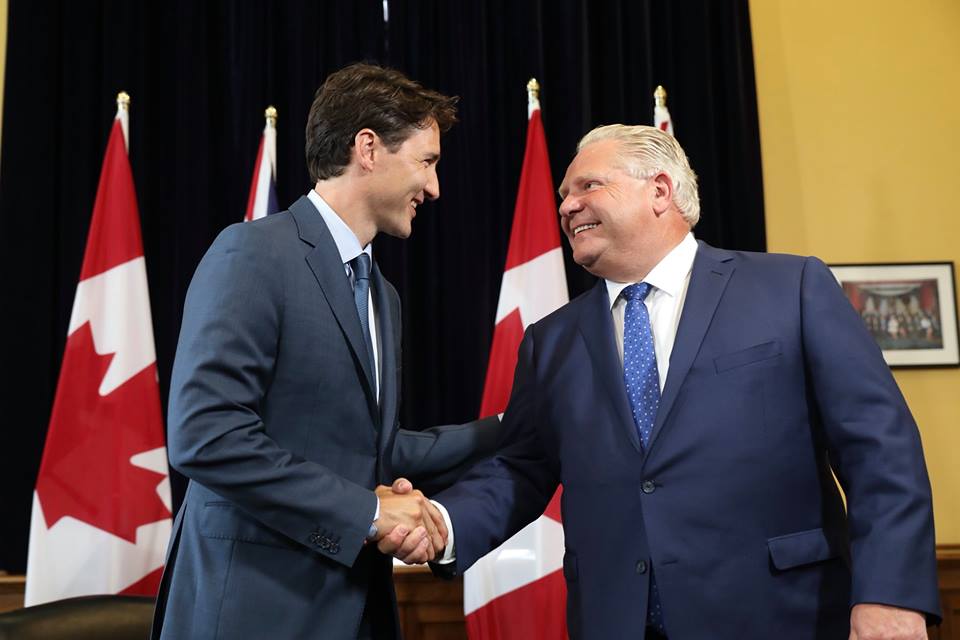Canada News
Trudeau, Ford clash over asylum seekers in first official meeting

Moments before the meeting, Premier Doug Ford blamed the federal government’s immigration policies for putting a strain on local and provincial resources, saying Trudeau’s administration has encouraged people to cross into Canada illegally. (Photo: Justin Trudeau/Facebook)
TORONTO — Prime Minister Justin Trudeau’s first official meeting with Ontario’s newly elected premier started with a friendly handshake Thursday, but it was clear the two leaders were miles apart when it comes to Ottawa’s handling of the recent surge in asylum seekers.
Moments before the meeting, Premier Doug Ford blamed the federal government’s immigration policies for putting a strain on local and provincial resources, saying Trudeau’s administration has encouraged people to cross into Canada illegally.
“This has resulted in a housing crisis and threats to the services that Ontario families depend on,” Ford’s office said in the statement. “This mess was 100 per cent the result of the federal government, and the federal government should foot 100 per cent of the bills.”
The move drew swift backlash from the provincial Opposition and prompted the federal government to pledge ongoing efforts to alleviate the burden on provinces, while urging Ontario to participate in the process.
Emerging from the meeting alone, Trudeau suggested Ford may not fully understand Canada’s international obligations when it comes to asylum seekers.
“I spent a little time explaining how the asylum-seeking system works and how our system is supposed to operate,” he said.
“At the same time I agreed that it would be good for our officials to sit down and get clarity on how we can actually work together to ensure that we are holding true to our values but making sure that our immigration and refugee system is being applied in its integrity.”
Lisa MacLeod, the provincial minister overseeing the immigration file, said Trudeau’s comments were “disrespectful” and argued neither the province nor its municipalities should be on the hook for commitments made by the prime minister.
“(Trudeau) was the one who tweeted out that everyone was welcome here and as a result of that we’ve had thousands of people cross the border illegally and it’s putting a strain on many of our public resources,” she said.
“If he wants to welcome them in, that’s fine, but he should make sure he’s paying for them and compensating the municipalities as well as the provincial government.”
The federal government recently pledged to give Ontario, Quebec and Manitoba $50 million to help offset some of the costs incurred due to the influx of asylum seekers illegally crossing the Canada-U.S. border.
The provinces, however, have asked for much more support.
Quebec, which has seen the bulk of asylum seekers arrive this year, has said its costs are closer to $146 million, though that tally includes projections for future expenses. The province is set to receive $36 million from Ottawa.
Ontario has been promised $11 million by the federal government but Toronto Mayor John Tory has said the city alone needs $64 million to recoup costs. The number of refugees and asylum claimants using the city’s shelter system went from 459 in 2016 to 3,209 as of last month, according to a city report.
Hundreds currently being housed in college dormitories will be forced out in early August as schools prepare for students to return, the report said.
“The City of Toronto has been clear that we need assistance to deal with unprecedented numbers of refugee claimants and asylum seekers. The province has made its initial position clear,” Tory said in a statement Thursday.
“I will continue to urge the Canadian government to take immediate action and I am optimistic that the federal government will work with us to fulfil its responsibility to help cities deal with these families.”
Federal Immigration Minister Ahmed Hussen has said the money already allocated is meant to help address some of the immediate temporary housing needs in those provinces.
A spokesman for the minister said Thursday the department is committed to working with the provinces on this issue.
“Over the past year, we have also worked closely with Quebec to ensure that adequate resources are in place and that every action is taken to reduce the impacts on provincial social services. We are ready to recreate this model in Ontario, and we need the collaboration of the provincial government.”
Ontario’s former Liberal government signed an immigration agreement with Ottawa in November of last year.
Under the deal, Ontario agreed to resettle a share of refugees “recognizing the need for flexibility in responding to emerging humanitarian needs,” while Ottawa agreed to take into account the potential financial impact on the province and consider the need for additional supports.





















